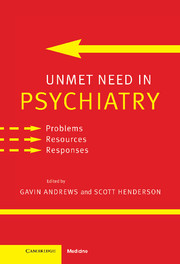Book contents
- Frontmatter
- Contents
- List of Contributors
- Preface
- Part I Unmet need: defining the problem
- Part II Unmet need: general problems and solutions
- Introduction
- 4 The epidemiology of mental disorder treatment need: community estimates of ‘medical necessity’
- 5 Some considerations in making resource allocation decisions for the treatment of psychiatric disorders
- 6 The need for psychiatric treatment in the general population
- 7 Comparing data on mental health service use between countries
- 8 The challenges of meeting the unmet need for treatment: economic perspectives
- 9 Unmet need for prevention
- 10 Meeting unmet needs: can evidence-based approaches help?
- 11 Unmet need for management of mental disorders in primary care
- 12 Is complementary medicine filling needs that could be met by orthodox medicine?
- Part III Unmet need: people with specific disorders
- Part IV Unmet need: specific issues
- Part V Unmet need: conclusion
- Index
10 - Meeting unmet needs: can evidence-based approaches help?
from Part II - Unmet need: general problems and solutions
Published online by Cambridge University Press: 21 August 2009
- Frontmatter
- Contents
- List of Contributors
- Preface
- Part I Unmet need: defining the problem
- Part II Unmet need: general problems and solutions
- Introduction
- 4 The epidemiology of mental disorder treatment need: community estimates of ‘medical necessity’
- 5 Some considerations in making resource allocation decisions for the treatment of psychiatric disorders
- 6 The need for psychiatric treatment in the general population
- 7 Comparing data on mental health service use between countries
- 8 The challenges of meeting the unmet need for treatment: economic perspectives
- 9 Unmet need for prevention
- 10 Meeting unmet needs: can evidence-based approaches help?
- 11 Unmet need for management of mental disorders in primary care
- 12 Is complementary medicine filling needs that could be met by orthodox medicine?
- Part III Unmet need: people with specific disorders
- Part IV Unmet need: specific issues
- Part V Unmet need: conclusion
- Index
Summary
In this chapter, we will discuss our attempt to develop evidence-based systems for defining, guiding, and monitoring aspects of psychiatric care in the USA; some of the limitations in these approaches (i.e., we should not get too overconfident about our capacities); and finally provide some recommendations about how to deal with some of these limitations – and particularly the role of a practice-based research network.
Basically, the problem put before contributors to this volume can be framed as four questions. Who gets treatment? What treatments are or should be provided? How are treatments provided – by whom, how much, and for how long? (and this ultimately translates into the economics). And, on what basis do we determine the above ‘who’, ‘what’, and ‘how’ – do we base it on tradition, on market values, or on evidence?
The Diagnostic and Statistical Manual of Mental Disorders (DSM-IV) introduction is clear in defining mental disorders as a grouping of symptoms plus either clinically significant distress or impairment in major role functioning [American Psychiatric Association (APA), 1994a]. The challenges are to determine which treatments are effective for whom, and to make sure that the people most in need get those treatments. It is important to define how we develop systems that encourage incentives for ensuring that the people in need of treatment receive the most appropriate medical care. In the USA there has been enormous growth in ‘managed care’ as a general approach for making these determinations. Our group has developed a model (Figure 10.1) of how managed care affects patient care, which can be applied to evaluating the processes of any health plan (Pincus, Zarin & West, 1996).
Keywords
Information
- Type
- Chapter
- Information
- Unmet Need in PsychiatryProblems, Resources, Responses, pp. 146 - 156Publisher: Cambridge University PressPrint publication year: 2000
